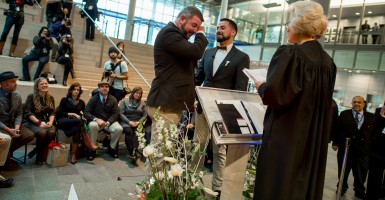Earlier today, the North Carolina House voted to override the veto of S.B. 2, a bill that protects the religious liberty of civil servants in that state. Because the Senate had already voted to override the veto as well, the bill is now law. This is good public policy, and it is a shame that it was vetoed in the first place.
The law will now protect magistrates who object to performing solemnizing ceremonies for same-sex marriages and clerks who object to issuing same-sex marriage licenses. It also makes clear that no one can be denied a marriage license, but magistrates or clerks could recuse themselves from the process behind the scenes should they have sincere objections to same-sex marriage.
So it’s a win-win for everyone. No one loses anything.
After all, government employees have rights, and those rights should be protected. Had this bill not become law, magistrates and clerks who decline to take part in same-sex marriages could have been removed from office, and “shall” be guilty of a crime that is punishable by up to 120 days in jail.
Consider a county clerk who has served in her job for decades issuing marriage licenses. Now the government has redefined marriage—and her job. Should she be forced in all circumstances to violate her beliefs? Indeed, two former magistrates are suing the North Carolina Administrative Office of the Courts precisely because they were told to issue same-sex marriage licenses or be fired and risk criminal prosecution.
They resigned—but they shouldn’t have had to. Indeed, Title VII of the Civil Rights Act of 1964 requires the government to accommodate conscientious objectors as best it can. Title VII applies to all employers, including the federal government, and requires that employers grant reasonable religious accommodations to employees, provided those accommodations don’t create an undue hardship for the employer.
>>>For more on this, see Ryan T. Anderson’s new book, “The Future of Marriage and Religious Liberty.”
The North Carolina law makes it clear that magistrates should be accommodated whenever possible—and, at the same time, that all citizens should be able to receive marriage licenses. In other words, it’s a win-win situation. The law of religious accommodation for public employees is complicated but perhaps not as difficult as we sometimes make it.
Professor Robin F. Wilson of the University of Illinois Law School writes, “A common refrain is that religious objectors in government service should do all of their job or resign. This stance conflates the public receipt of a service offered by the state with the receipt of that service from each and every employee in the office who is available to do it.” In other words, as Wilson says, citizens have a claim to receive certain “services from the state, but they do not necessarily have a claim to receive the service from a particular public servant.”
Religious objection is not a trump card, but employees’ religious objections should be accommodated when possible. The North Carolina law is a great example of this and a good model for achieving peaceful coexistence going forward.





























